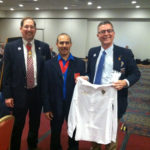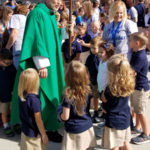By Corinne Winter
During the morning news, I have seen a commercial that begins, “We’re all waiting for 2020 to end.” The first time I heard that, I said, “They certainly got that right!” I was less impressed by the ad’s proposal that fast food hamburgers might help make the wait more bearable. I do sense that many of us feel a sense of impatience and restlessness (“pandemic fatigue”) as the days darken and the news just seems to get worse on so many fronts: health, climate, politics and more. The situation puts multiple clamps on activities we long for: gathering with friends and family, hugging them, sharing festive meals, filling gathering spaces with conversation and churches with people and with song.
 This will be an Advent during which our longing for good news is palpable. And so, perhaps, the readings and prayers of the season will speak to us in new ways. Coming at the start of the liturgical year, Advent calls us to find hope in the darkest of times. We hear the stories of the Jewish people going through times of captivity and persecution, called to keep hoping in God’s promises, doing so sometimes with greater and sometimes with less success.
This will be an Advent during which our longing for good news is palpable. And so, perhaps, the readings and prayers of the season will speak to us in new ways. Coming at the start of the liturgical year, Advent calls us to find hope in the darkest of times. We hear the stories of the Jewish people going through times of captivity and persecution, called to keep hoping in God’s promises, doing so sometimes with greater and sometimes with less success.
Do we not experience similar ups and downs in our own attempts to remain hopeful? We stay apart from others in hopes that there will be a time of joyful reunion. But will that ever come? Will we make up for lost time? Some reflection on hope as a theological virtue may help put those ups and downs into perspective.
The virtue of hope is directed toward God’s ultimate promise of eternal life as that which sustains us during this life. That may be a longer view than we are inclined to take much of the time. We want to hope for the virus to be overcome, for the political situation to calm down, for schools to open, allowing young people the interaction and educational opportunities they need. All of those are real values and desiring them is not opposed to the virtue of hope. What the longer view should do is help us put all other values in proper perspective. The things we long for are good; they are God’s gifts. But they are not the ultimate good. Nor are they the ultimate source of human happiness.
The Catechism of the Catholic Church includes the following additional value of the virtue of hope: “Buoyed up by hope, [we are] preserved from selfishness and led to the happiness that flows from charity (CCC 1818).” When we focus on the needs of others, we have less time and energy for stewing about what we are not enjoying. Pope Francis, in Fratelli Tutti, asserts that the virus has shown us that we “are part of one another,” and “need to be saved together (FT 32).” In order for that to happen, we must work to modify our behavior as we seek what we desire, according to the common good. That is what it means to be preserved from selfishness. Thus, to take a commonly used example, we are willing to put up with the minor discomfort of wearing a mask and to forego some of our common activities because doing so will help safeguard the health of others.
The call to seek the “happiness that flows from charity” applies as well to the divisions we see so clearly in our society. Many of those divisions are cultivated by a false notion that in order to have power, we must dominate others. Dominating may provide a false sense of security but ultimately it becomes a kind of prison for the one who wields it.
On the other hand, power understood as the power of love transcends barriers. Pope Francis refers to St. Francis of Assisi as one who set himself free from the desire to wield power over others and thus was able to lead (FT 5). The pope calls us to hope in God’s goodness as it is found in humanity whom God has created. Armed with that hope, we will seek not to overcome others and their ideas but to be enriched through encounter with them. We will pursue ideals rather than ideologies.
Health experts and others have warned us that the winter is likely to be a dark time in more ways than one. Moreover, the darkness will not suddenly disappear on Dec. 25 or Jan. 1. Some aspects of the dark will be with us throughout our lives. As Christians celebrating the season of Advent, we are called to practice the virtue of hope, to take the long view that puts everything into perspective and gives us the power to act in love. It is not an easy vocation. May our Advent prayers help us take at least a few steps toward being instruments of the hope that the world so desperately needs.
(Corinne Winter is a professor-emerita of St. Ambrose University, Davenport.)











